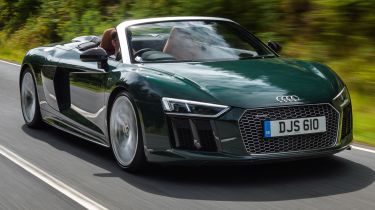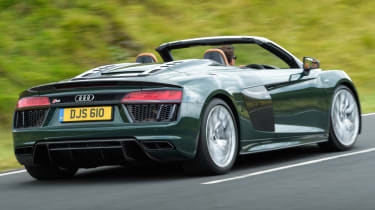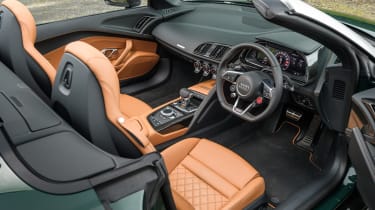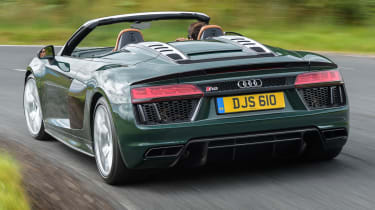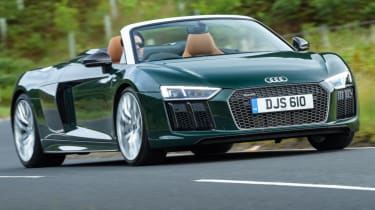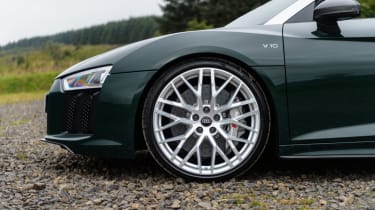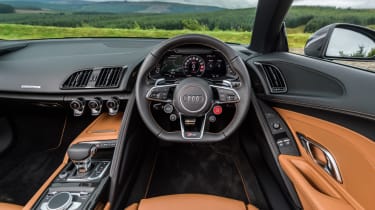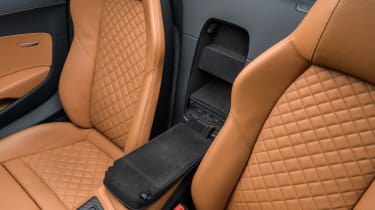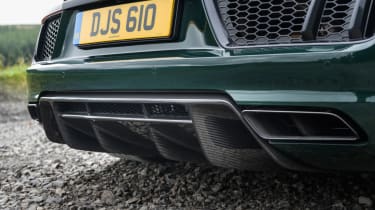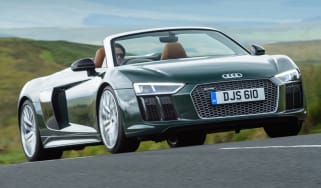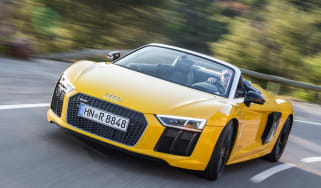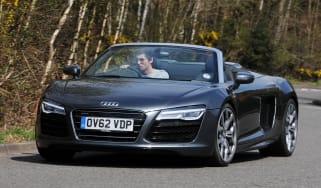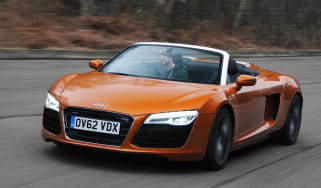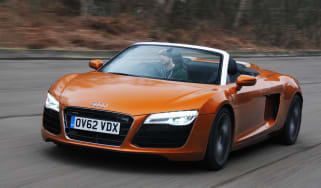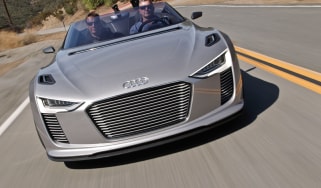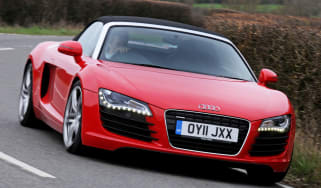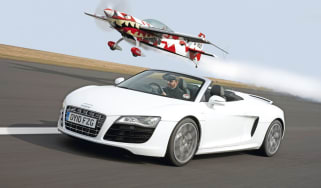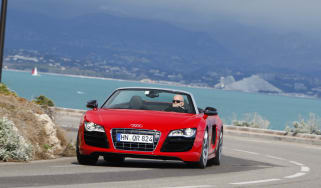Audi R8 Spyder (2016-2023) review
The Audi A8 Spyder is pure theatre, with a trick folding roof and a screaming V10 soundtrack

In many ways, the Audi R8 Spyder is a distinctly old-school supercar, powered, as it is, by a naturally aspirated 5.2-litre V10 engine. But there’s nothing old-fashioned about the overall package, because the Spyder is dripping with modern technology.
There are some who dismiss the Audi R8 as an expensive TT, but these people tend not to have experienced Audi’s supercar for themselves. Besides, the last time we looked, the TT wasn’t available with a V10 engine, offering a choice of 533bhp and 602bhp outputs.
The Audi R8 can trace its roots back to the Le Mans quattro of 2003, a concept unveiled to celebrate three successive wins at the Le Mans 24 Hours race. We’d have to hang on for another three years for the production version, but it was worth the wait.
Launched as a coupe in 2006, the R8 shared its platform with the Lamborghini Gallardo and offered a choice of engines: a 4.2-litre V8 or a 5.2-litre V10. The Spyder version arrived in 2009, following a high-profile premiere in the Iron Man 2 movie.
A facelift was announced in 2012, before the second-generation R8 was unveiled at the 2015 Geneva Motor Show. Although some criticised the evolutionary styling, the new model is a comprehensive reworking of the original, sharing its platform with the Lamborghini Huracan.
Used - available now

2022 Kia
e-Niro
33,290 milesAutomaticElectric
Cash £20,197
2021 BMW
1 Series
60,610 milesAutomaticPetrol1.5L
Cash £17,697
2014 BMW
1 Series
130,000 milesManualDiesel2.0L
Cash £4,498
2014 Ford
C-Max
39,000 milesManualPetrol1.0L
Cash £4,898Major changes included the dropping of the V8 engine, along with the demise of the manual gearbox, ditched in favour of a seven-speed S tronic twin-clutch transmission only. However, quattro four-wheel drive remains, with Audi adding a number of driver aids.
The R8 Spyder arrived in 2016 and two versions are available: a V10 with 533bhp and a V10 plus with a mighty 602bhp on tap. There are no trim levels as such, although the ‘plus’ model is pre-loaded with extras, such as ceramic brakes, high-beam assist, gloss carbon exterior styling pack, bucket seats and stainless steel pedals.
Rivals include the Lamborghini Huracan Spyder, Porsche 911 Turbo Cabriolet, Mercedes-AMG GT Roadster, McLaren 570S Spider and Ferrari California T.
Make no mistake, right now this is one of the world’s greatest performance cars. Far from diluting the experience, removing the roof has created one of the most desirable supercars, and the Spyder feels every inch as good to drive as the R8 coupe. At its heart is the screaming V10 engine, which can be enjoyed with the sun on your face and the wind in your hair. It might not be cheap, but the Audi R8 Spyder is as close to sports car perfection as you can get. Priceless.
Engines, performance and drive
If the evolutionary styling has left you a little cold, allow the driving experience to crank up the heat. Make no mistake, the Audi R8 is a scintillating supercar, and removing the roof simply adds to the theatre.
Naturally, the first job is to lower the roof, which weighs just 44kg and can be opened or closed within 20 seconds at speeds of up to 31.1mph. Yes, the Spyder is 50kg heavier than the R8 coupe, but amazingly the torsional rigidity has increased by over 50 percent compared with the previous model.
Drive the Spyder back to back with the coupe on a public road and you’ll be hard pressed to notice any difference between the two. With the roof up, it’s easy to forget you’re in a Spyder, and that’s a huge compliment. There’s not much wobble from the structure, even on roads that would have a hatchback’s interior rattling.
Roof down, the R8 Spyder delivers its major USP: the sound. Without a slice of aluminium above your head, and with the glass partition behind you lowered into the bulkhead, you’re free to enjoy the full roar of the V10 engine, which gets louder and more dramatic the more you press on.
Drop the aero screen that sits behind the seats and it’s akin to powering up a Marshall amp and cranking it up to 11. Hit the 8,500rpm redline and it’s like being in the front row at Last Night of the Proms. Only the V10 is more tuneful. And doesn’t wear a Union Flag hat.
It would be tempting to play around with the various settings, but with the V10 burbling away behind your head, it’ll take all your willpower not to just stick it in Drive and make full use of the available power.
Any concerns about the lack of a manual gearbox are soon forgotten, because the S tronic transmission delivers lightning-quick changes, leaving you to concentrate on steering and stopping. Even slowing down is an event, with the ‘bangs’ and ‘crackles’ from the exhaust on the overrun adding to the experience.
While we’d like a little more feedback through the flat-bottomed wheel, the four-wheel drive system inspires so much confidence, it hardly seems to matter.
The traction on dry roads is unbreakable, while in the wet you can feel the system subtly shifting the torque between front and rear axles to keep you straight and stable. If you’ve got any lock on, you might get a faint sense of the steering tightening up as the front driveshafts distribute some power, but the benefits are obvious – especially in the wet. Truth is, finding genuine faults would be nitpicking.
In fact, the R8 Spyder is so exhilarating, we’d question why you’d buy the coupe, even taking into account the £8,500 saving. This is undoubtedly the best R8 money can buy and arguably the best Spyder in the world.
Engines
The ‘standard’ 5.2-litre V10 engine delivers 533bhp at 7,800rpm, allowing the R8 Spyder to sprint to 62mph in just 3.6 seconds, before going on to reach a top speed of 198mph.
The V10 plus ups the ante with 602bhp at a dizzying 8,250rpm - enough to top 205mph after seeing off 62mph in 3.3 seconds. Do you need the extra performance? Probably not, but you’ll never tire of listening to the full bore V10 at 8,250rpm; and, many potential buyers will consider the more potent engine worthy of the premium the plus costs.
With the additional power comes the need to stop, which is why the V10 plus is fitted with ceramic brakes as standard. They’re a £7,000 option on the ‘slower’ R8 Spyder, but who are we trying to kid? The V10 plus is the one to go for.
MPG, CO2 and Running Costs
Fuel economy and CO2 emissions won’t be high on the list of priorities of an R8 Spyder buyer, but this particular supercar is surprisingly efficient.
That the R8 Spyder is lighter than its predecessor certainly helps, but the fuel efficiency is enhanced by a freewheeling mode, allowing the R8 to coast when the engine is disengaged. Other ‘tricks’ include cylinder-on-demand technology, which shuts down five cylinders when not required, and a start-stop system.
As a result, the ‘standard’ V10 could return as much as 24.1mpg on a combined cycle, while the V10 plus drops slightly to 22.6mpg. You’ll need to go easy on your right foot, mind, if you’re hoping to break into the low 20s in everyday use.
Perhaps unsurprisingly, both models slot into the top rate of VED car tax, with CO2 emissions of 277g/km and 292g/km for the full-fat R8 Spyder. This equates to a ‘showroom’ tax of £2,000, followed by £440 for five years starting in year two.
That’s because the R8 is subject to the £310 annual supplement for cars above £40,000. However, we suspect this won’t be too much of an issue for someone spending upwards of £132,000 on a new car.
Insurance groups
It won’t surprise you to learn that the Audi R8 Spyder falls into the highest Group 50 insurance rating. It might be a supercar you can use daily, but it ranks alongside cars from the likes of Ferrari, Lamborghini and McLaren from an insurance perspective.
While the Audi R8 Spyder is fitted with an alarm and immobiliser, a garage is advisable for overnight parking. For the small price of £250, Audi offers a garage door opener, which is incorporated in the interior lighting module. Press a button to open or close garage doors and exterior gates.
Depreciation
Thanks to a combination of brand image, performance and exclusivity, the Audi R8 Spyder is one of the slowest depreciating cars on the market. Even the earliest first-generation models command prices in excess of £60,000.
The biggest hit comes when the car first drives off the forecourt, with ex-demonstrators available with a £10,000 to £15,000 discount. From that point, the rate of depreciation is far slower.
Interior, design and technology
To the untrained eye, the new R8 Spyder might look similar to the previous model, but parked side by side, the changes are more pronounced. It's 14mm shorter than the previous Spyder, but it’s also 36mm wider, making it look impossibly large from the outside.
The sense of width is accentuated at the back, with trapezoidal tailpipes flanking a diffuser with vertical ribs. The rear lights are typically ostentatious, featuring 118 individual LEDs.
But while the trick folding roof might deliver a massive helping of kerb appeal, it does mean that the Spyder has to do without the glass engine cover you get on the coupe, meaning the glorious V10 engine is hidden from view.
Inside, the R8 Spyder is a masterclass of fit and finish, designed to put the driver at the heart of the action. The wraparound dashboard is focused on the driver, with the majority of functions accessible without the need to take your hands off the wheel.
Even the red starter button is situated on the flat-bottom steering wheel, opposite another button used to select from the different driving modes. There’s a genuine ‘race car for the road’ feel in the R8 Spyder.
Sat-nav, stereo and infotainment/h3>
Taking centre stage is Audi’s excellent 12.3-inch Virtual Cockpit, with its configurable TFT screen, operated by the multifunction steering wheel or rotary dial on the centre console.
New to the R8 Spyder is Audi’s smartphone interface, which uses Apple CarPlay or Android Auto to display smartphone contents via the Virtual Cockpit. You can also add a wireless phone charger, which is added to the centre console.
Another option is the Bang & Olufsen audio upgrade, which adds a 550-watt amplifier, subwoofer and 13 speakers, two of which are integrated into the head restraints. At £1,750, it isn’t cheap, and while this may sound a cliche, we’d rather listen to the V10 engine.
Practicality, comfort and boot space
Aside from some lost luggage space, the only real difference between the Spyder and the coupe is the absence of aluminium above your head, replaced by a strip of canvas. It’s a two-seater supercar, so you shouldn’t expect acres of room, but there’s enough for everyday driving.
Being hyper-critical, we’d say that the driving position isn't quite perfect, but this can be improved with the fitment of bucket seats, which are standard on the V10 plus and a £3,000 option on the standard model.
Elsewhere you’ll find two cup-holders, a reasonable size glovebox and a shallow cubby on the transmission tunnel.
Size
The latest R8 Spyder is 36mm longer than its predecessor, resulting in an overall length of 4,426mm, the same as the coupe. At 2,037mm with the mirror doors folded out, the width is also identical, while the Spyder is 5mm taller at 1,245mm.
Leg room, head room & passenger space
The roof mechanism robs the cabin of some space, which means the seats don’t recline as far as they do in the coupe. That said, even the tallest drivers should find a comfortable driving position.
Note that unlike the Porsche 911 Turbo Cabriolet, the R8 Spyder has no occasional seats in the back; this is strictly a two-seater supercar.
Boot
The R8 Spyder features the same 112-litre luggage compartment as the coupe, but has to forgo the additional 226 litres behind the seats, because this area is taken up by the roof mechanism. For some context, the McLaren 570S Spider offers 144 litres of luggage space in the nose.
As a result, the R8 Spyder is far less practical than the coupe, although the boot in the nose is just about large enough for a travel case and a shoulder bag.
Reliability and Safety
Audi has developed a reputation for quality and reliability, and as the flagship of its range of performance cars, the R8 Spyder is unlikely to deliver any problems. This is one supercar you can use every day, assuming you can live with the inevitable thirst.
The low-stress 5.2-litre V10 engine and twin-clutch S tronic transmission have been developed to handle punishing track use, which means day-to-day reliability issues are uncommon.
That said, Audi finished a disappointing 18th out of 27 for best car manufacturers in our 2017 Driver Power Survey, with a score of 89.21 percent placing the German company below the likes of Fiat, Suzuki and Peugeot.
The R8 Spyder is unlikely to be tested by Euro NCAP, but strength is provided by its aluminium and carbon-fibre platform, making it 50 percent stiffer than the previous Spyder.
Driver, passenger and side airbags are fitted as standard, although the Spyder loses the curtain airbag fitted to the R8 coupe. An ISOfix child seat mounting is fitted to the passenger seat, unless you tick the box marked ‘bucket seats’.
All new R8 owners are invited to take part in a complimentary driving experience day at Silverstone. Drivers are given expert tuition, which should improve safety on the open road.
Warranty
The R8 Spyder is covered by Audi’s standard three-year warranty, providing cover for unlimited mileage in the first two years and up to 60,000 miles in the third.
A fourth year can be added for £1,035, which covers the R8 Spyder for four years or 75,000 miles, whichever comes sooner. Again, the cover is unlimited in the first two years, but restricted to 75,000 miles in years three and four.
Finally, a five-year or 90,000-mile warranty extension is available for £2,555. In all cases, the warranty is transferable between owners.
Servicing
Servicing your Audi supercar is no more onerous than caring for an A1 or A3. Depending on the amount of miles you intend to drive in a year, you can choose from either a fixed inspection or flexible service schedule.
The fixed inspection service schedule is designed for drivers covering fewer than 10,000 miles per annum and includes an oil-change service every 9,000 miles or one year and an inspection service every 19,000 miles or two years.
Anyone expecting to cover more than 10,000 miles a year should select the flexible service schedule, which includes an oil-change service at variable intervals up to a maximum of every 19,000 miles or two years, plus an inspection service every 19,000 miles or two years.
